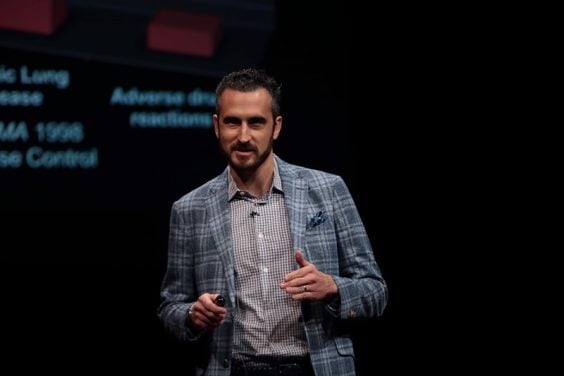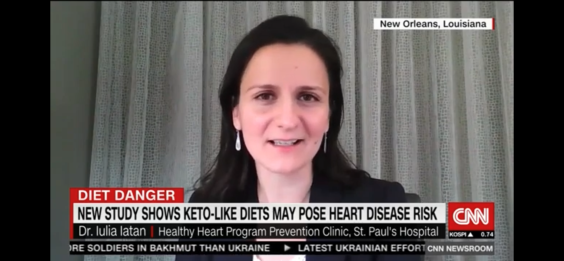New research suggests that a low-carb, high-fat diet, similar to the popular ‘keto’ diet, may be linked to increased levels of “bad” cholesterol and a higher risk of heart disease. The study, led by Dr. Iulia Iatan with the Centre for Heart Lung Innovation and the Healthy Heart Program Prevention (HHPP) Clinic at St. Paul’s Hospital, and Dr. Liam Brunham, senior author and Medical Lead of the HHPP, is one of the first of its kind to examine the association between this type of diet and cardiovascular outcomes.
This research was presented at the American College of Cardiology’s Annual Scientific Session together with the World Congress of Cardiology earlier this week.
A pattern of high cholesterol after following this diet
Drs. Brunham, Iatan and colleagues kept seeing patients come into their clinic with high cholesterol levels – and occasionally even heart disease – after following a low-carb, high-fat (LCHF) diet.

“They would come in, very young but with very high cholesterol after following this diet, despite prior normal levels” says Dr. Iatan.
The researchers wanted to investigate this potential connection with cardiovascular disease. The study they conducted compared 305 people eating a LCHF diet with around 1200 people eating a standard diet, using health information from the UK Biobank, which followed the participants for at least a decade.
“We were interested to see if there was any relationship between this dietary pattern, cholesterol levels, and any risk of heart disease,” says Dr. Iatan.
The study found that regular consumption of a self-reported diet low in carbohydrates and high in fat was associated with higher levels of ‘bad’ cholesterol and double the risk of cardiovascular events like blocked arteries, heart attacks and strokes.
What is a low-carb, high-fat diet – and what makes it different from keto?
For the purposes of the study, a low-carb, high-fat (LCHF) diet was defined as more than 45 per cent of total daily calories coming from fat, and less than 25 per cent coming from carbohydrates. While the LCHF diet used in this study has been described as “keto-like,” it doesn’t meet the technical criteria for the keto diet, which is even lower in carbs (less than 10 per cent) and higher in fat (more than 70 per cent). Read more about the keto diet in this Daily Scan article.
The researchers chose to look at this broader LCHF diet because the keto diet can be very restrictive and difficult to maintain long-term. They also wanted to have enough participants on the LCHF diet to draw meaningful conclusions.
Study suggests potential harms outweigh benefits
The study found that people on a LCHF diet had higher levels of low-density lipoprotein (LDL) cholesterol, commonly known as “bad” cholesterol, which causes a higher risk of cardiovascular events. The LCHF diet doubled the risk of cardiovascular events such as blocked arteries, heart attack and stroke, after adjusting for obesity, diabetes, high blood pressure and smoking. 9.8 per cent of people on the LCHF diet experienced a new cardiac event, compared with 4.3 per cent of those on a standard diet.
LCHF diet participants’ total fat intake was higher in saturated fat and had double the consumption of animal sources compared to the control group.
“What’s interesting to mention is that, when you look at the percentage of people in each dietary group that would be defined as having severe high cholesterol, we found that approximately six per cent of patients in the standard group had very high cholesterol, versus eleven per cent in the low-carb, high-fat group,” says Dr. Iatan. Severe high cholesterol is defined as having LDL-cholesterol above 5.0 millimoles per litre, or 190 milligrams per decilitre. This is also the group in whom the greatest increase in cardiovascular risk was observed.

Not all LCHF diets are the same
The study’s findings also suggest that not everyone responds to a LCHF diet in the same way. Cholesterol levels rise on average, but that can vary in individuals depending on several underlying factors, including genetics, length of time on the diet, and differences between foods chosen in place of carbs.
While LCHF diets heavily rely on fats, those fats can come from healthy unsaturated sources like avocadoes, tofu, nuts, seeds, and olive oil, or from saturated fats like lard, butter, coconut oil, whole-fat dairy milk and cheese, and mayonnaise.
“What we think is important, is to make sure that when we restrict the carbs, we replace them with healthy fats – nuts, seeds, fish, and plant-based alternatives – rather than just saturated fats,” says Dr. Iatan.
Still more to learn
Because this study was observational in nature, it can only demonstrate an association between the diet and an increased risk for major cardiac events – it doesn’t definitively prove cause and effect. Further research is needed into the potential risks and benefits of LCHF diets, especially considering their popularity.
If someone wants to try a LCHF diet, Dr. Iatan recommends that they contact a medical provider, keep track of their cholesterol levels, and try to address any other risk factors for heart disease.
“If someone does go on a low-carb, high-fat diet, they should be aware that it could lead to an increase in their levels of cholesterol,” she says.
Dr. Iatan spoke with CNN about this research. You can watch the video here.
Story by Grace Jenkins, Providence Research





